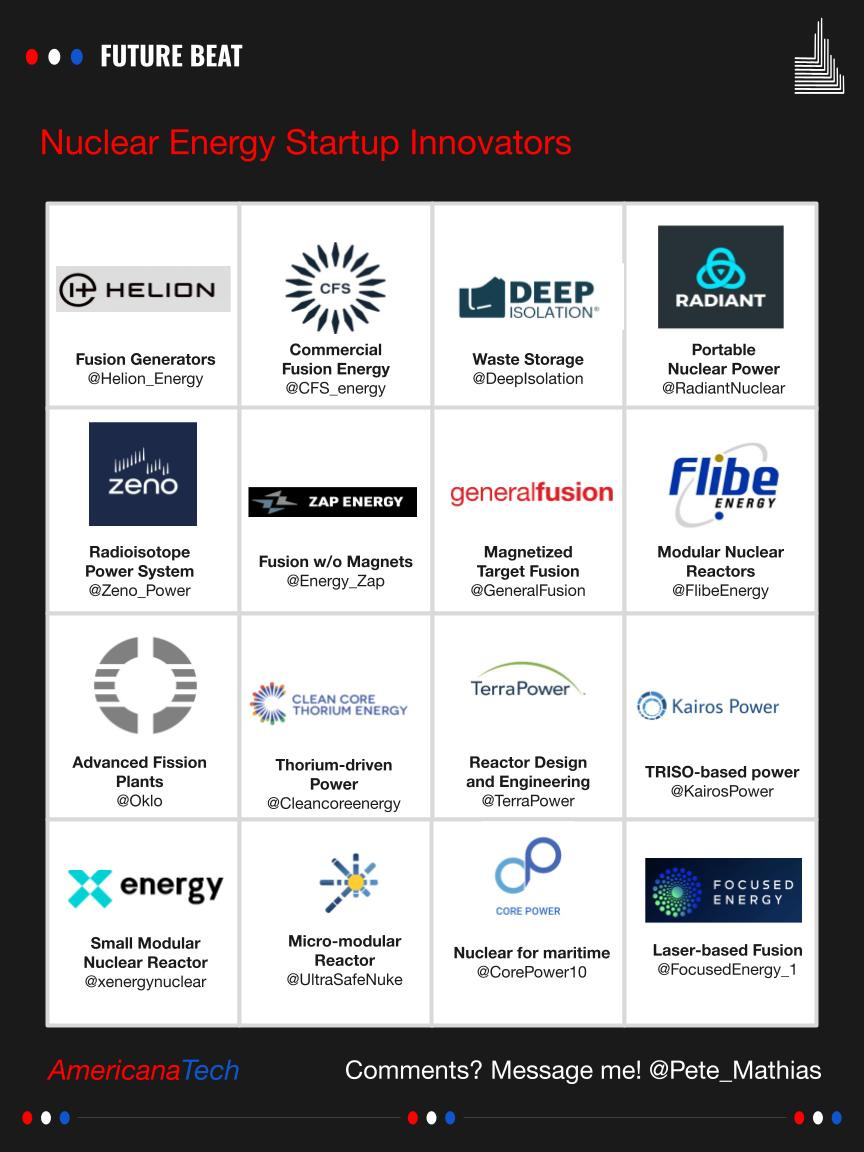What I call “Americana Tech” focuses on innovation areas critical to the United States. This includes Power, or tech powering economic inputs. Today I want to talk about a dark horse power source— one many counted out long ago. Nuclear energy.
Growing up “Next to Nuclear” in Palisades, Michigan
My grandmother “Gigi” lived a lifetime next door to nuclear. She was a neighbor to Palisades Nuclear Generation Station along Lake Michigan. I spent many summers swimming a literal “stones throw” from those reactors.
Memorial Day to Labor Day, I never had any reason to fear nuclear. I never saw a four-legged frog– or a tadpole with two tails. A fluffy white cloud easily mistaken for any other water vapor cloud was the only visible sign of “The Power Plant,” as we called it.
Then it was “Back to School.” Back to Chicago classrooms where I learned about Hiroshima. And Chernobyl. History 101 scares anyone with a heart away from nuclear. To fear fission is to respect history.
Sudden change: Nuclear in a new light
Suddenly last year I started to see nuclear in a new light. What happened? A friend, Julia DeWahl, published her own self-reflections on nuclear energy. Julia, a supremely bright and open-minded individual, concluded: “nuclear energy’s carbon-free, 24/7 qualities make it undeniably attractive to meet the demands of clean, firm power, where both fossil fuels and renewables fall short.”
Julia’s provocative piece inspired me to revisit my views. While to fear fission is to respect history, to confuse science with politics seems pretty bad, too. Holding firm opinions loosely, I am beginning to educate myself further on nuclear.
This note does two things:
Summarizes the main arguments for and against nuclear energy
Highlights some startups innovating in this space.
Symposium stances: For and against nuclear
Where do you stand on nuclear? To help, here are the main arguments.
For (Nuclear = “Friend”)
Reliability - Whereas renewables (solar, wind) are weather-dependent, nuclear is consistent in most any environment
Sustainability - Nuclear power does not produce carbon dioxide (“climate friendly” in that regard)
Density - Not much physical space is required to provide outsized amounts of energy
Security - Countries with high electricity demands can reduce foreign dependencies
Against (Nuclear = “Foe”)
Safety
Accidents: Bad, outlier events are devastating (Chernobyl, Fukushima)
Waste: Nuclear materials remain radioactive for thousands of years
Weapons: Tech in power plants can also be used to produce nuclear weapons
Cost: Plants are expensive to build and maintain
Alternatives: Renewable alternative energy (solar, wind, hydro) are available
Innovation Areas: The “3Ds” of Nuclear Innovation
I call it “3Ds” of nuclear startup innovation:
Design: Startups are exploring new reactor designs that implement (a) different coolants (e.g. liquid metal vs. molten salt); b) different fuels (e.g. thorium); (c) different atomic processes, specifically fusion (combining nuclei) versus the prevailing process of fission (separating nuclei) — (see major breakthrough from the DOE)
Distribution: Since plants are expensive to build, startups are reimagining the supply chain and assembly via Small modular reactors (SMRs). These can be made in factories and transported for on-site assembly at better prices
Disposal: Powered by R&D studies on nuclear waste management, startups are finding ways to more effectively dispose of nuclear waste. There is also substantial innovation around de-comissioning — or the process of shutting down a nuclear plant
Illustrative Startups: Market Map
Here are just a few companies innovating in the space:
Parting Words from a Submarine Nuclear Electrician
The other day a submarine nuclear electrician formerly in the U.S. Navy wrote me a powerful note. In response to sharing my own thoughts on “nuclear as a dark horse,” Zach Durig shared:
As someone who lived and worked within 50ft of a nuclear reactor for years as a submarine nuclear electrician, I never understood why people were so terrified of nuclear power.
Plus, nuclear waste is so misunderstood and is far less dangerous than most think it is. I truly believe that the best way to protect the environment while also providing reliable power, we have to put a renewed focus on nuclear power.
Perspective like Zach’s requires more attention.
Conclusion:
Nuclear energy is an innovation frontier. Traditional (and valid) complaints about nuclear are now “Slide 1s” of Silicon-Valley backed startup pitches to solve enduring pain points. My suggestion is to pay attention to startups innovating in this space— I certainly am!
I would love to hear your views— so don’t hesitate to reach out.
Pete





